So the pandemic hasn’t ended. The current global crisis has placed unneeded strain on supply chains, workers, and likely you, the person playing games. But that didn’t stop the flow of new releases or diminish the number of exciting discoveries we’ve made, in games big and small. Merry-Go-Round Magazine’s staff might not have played as much as we usually do, but we still have seven games from 2021 we’re proud to recommend.
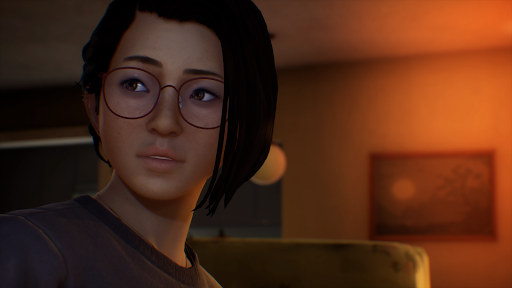
7. LIFE IS STRANGE: TRUE COLORS
Some things in a LIFE IS STRANGE game are inescapable. There’s always a young person with an inexplicable superpower, there’s always a plot that allows for plenty of charming “slice of life” moments, and there’s always some kind of relationship (or multiple) to put through the narrative ringer. TRUE COLORS takes a more adult tact, but it doesn’t upset the formula, it tries to perfect it.
Alex Chen has bounced from foster home to foster home, troubled by her inability to manage a powerful, supernatural form of empathy (she can see emotional auras, and eventually a lot more), but when she’s finally old enough to strike out on her own, she sets off to Colorado to reunite with her older biological brother Gabe. That could be enough for any narrative adventure game in its own right, but it’s to developer Deck Nine’s credit that it immediately becomes something more. TRUE COLORS might not be released episodically like its predecessors, but it’s still broken up into episodes, and more importantly, it embraces the granddaddy of TV plots: the smalltown mystery.
TRUE COLORS is chalk full of colorful characters and admittedly schmaltzy writing, but the best change it makes is thrusting strong performances into a more propulsive story. Erika Mori as Alex occasionally has to sell some clunkers, but her vocal and motion capture performance does wonders to color Alex as a vulnerable and capable person worthy of the central role her new found family places her in. It adds up to a LIFE IS STRANGE game that doesn’t reinvent the wheel, but proves the wheel was pretty good at rolling for a reason. Sometimes flats just need some air. [Ian Campbell]

6. SABLE
A crest of sand rolling off a hill. Tall rocks in the distance, impossibly tall, with dots that could birds circling above. You wrap your cloak tight around yourself, adjust your mask, and take off in your glider. You can probably reach them before it gets dark. The softer side of the “alien deserts are cool” coin (the other side being DUNE), SABLE has style for days and a deceptively emotional narrative. It also allows you to ignore everything and cruise around alien vistas on a floating, customizable, sentient motorcycle to a score composed by none other than Japanese Breakfast.
SABLE’s concerned with coming of age, facing uncertainty and finding solid ground to stand on in a literal desert. It’s not so much an epic odyssey as it is a collection of little moments that add up to the whole of a new thing, but that’s much more appropriate for the vibe of the game. Growing up isn’t a deadline, or a point on the map. It’s doing new things, going to new places, and meeting new people, until you realize you’re not quite the you that started worrying about growing up in the first place.
The game’s open ended structure supports that—you could do all of the quests in the game without it really “ending”—and so does the expressiveness of flying the glider. It’s alternatingly evocative and janky. Sometimes I’m smoothly carving up dunes while the score swells, and other times I’m popping over a hill, wobbling briefly, and thudding into the ground, dragging my glider’s wings through the dirt. No ride is perfectly smooth in SABLE, but that’s really just part of the fun. [Ian Campbell]
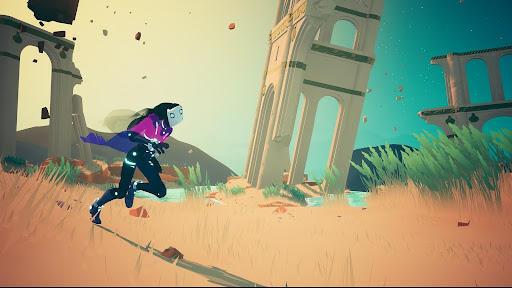
5. SOLAR ASH
If memory serves, Heart Machine’s previous release, HYPER LIGHT DRIFTER, also made it onto our year-end list, centuries ago in the hardscrabble years of 2016. There’s a strong similarity between DRIFTER and SOLAR ASH in terms of art design, sound design, and even narrative design, if we’re being honest. Fortunately the visual and audio aesthetic of both games are, as the youth say, A Whole Mood, encouraging full immersion into the game’s ambience. As Heart Machine moved from 2.5D to full 3D, it opened a doorway in level design that SOLAR ASH blasted through on rocket skates. These rocket skates are the main character Rei’s primary means of transportation, and the levels are so specifically crafted around her elegant motions that half the enjoyment of the game is moving around and seeing what Rei can grind, jump, and grapple around. The colossal boss battles also focus on movement and twitch-timing, making it a real joy when you finally put these mysterious anomalies down. If you ever want to experience what a vibe would be like as an interactive medium, SOLAR ASH is your best bet. [Steven Porfiri]

4. CHICORY: A COLORFUL TALE
There’s something about CHICORY: A COLORFUL TALE that feels incredibly maternal (I don’t think the dominance of female characters within the narrative is by accident). By maternal I mean that there’s this intense feeling of care that permeates the game, care that is meant to protect you from something outside, out of our control. There are forms of care that are one-to-one (I want you to feel good because I like you), and then there are forms of care that take into account what we’re up against (The world is a scary place, and we need each other). CHICORY is more concerned with the latter, caring for each other, not just because we want to, but because we need to on a very human level. It’s a small, sweet little game that starts off being about painting the environment and exploring a cartoony overworld, and then slowly becomes more and more intimate, dealing with themes of self-doubt, depression, and the roles of care and support in all of it.
CHICORY doesn’t shy away from acknowledging how rough the world can be, not in a trauma plot way, but more in how we are taught to be critical of ourselves. Titular character Chicory is a renowned artist whose depression makes them unable to feel joy in creating anymore, leading them to question why they should even still exist. Your playable character (named after your favorite food) begins from a different place, but ends up at the same conclusion, they feel they haven’t done anything of worth and question their existence and value.
It’s impossible to not relate to the characters in this game. You meet a frog detective on vacation that discovered the importance of a work/life balance after being overwhelmed, and a lion late in his artistic career who reassures you that nobody ever really knows what they’re doing. It’s a game that knows how hard it is to feel good about ourselves in this world, and it positions that feeling as its primary antagonist. It’s hard to talk about a game that’s most meaningful moments are the conversations you have in passing, the moments of reassurance from other characters that you matter and you’re doing great things. You are told so often how important you are; at first I found myself “aww”ing at the constant comments, but it wasn’t long until I was crying. The experience of playing CHICORY started off as a pat on the head, then a hand on the shoulder, and finally a warm hug. Time and time again you are reminded by everyone around you that you are loved, and what you make is beautiful, and even if you didn’t make anything, they would love you just the same. [Keven Hernandez]
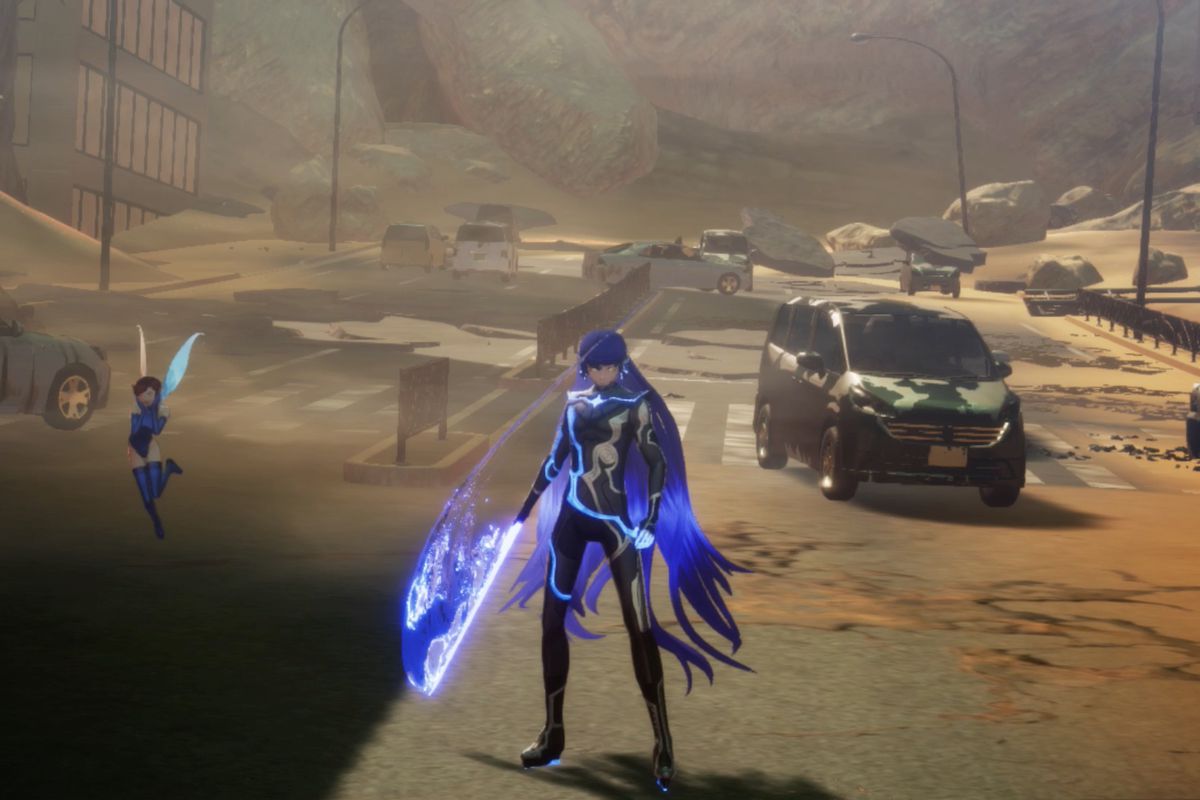
3. SHIN MEGAMI TENSEI V
For those who regularly engage in the JRPG sphere, you may remember a meme from back in November where big-name journalism outlets equated SHIN MEGAMI TENSEI V to being “Persona without the heart.” And while that sentiment is 100% due to most people’s ignorance to anything SMT-related outside the explosive success of PERSONA 5, it’s a thought that kind of undercuts what makes SMTV special.
To borrow another meme at said journo’s expense, SHIN MEGAMI TENSEI V is (unironically) the DARK SOULS of JRPGs: an oppressive, punishing, and deceptively minimalist distillation of the genre as a whole. Where most of its kind, popular spinoff included, have leaned into character-driven affairs—leaving combat in as a formality—SMTV relishes in its identity as a refined test of strategy and patience. It’s a game where failure to plan ahead or treating your demonic opposition as something you just power through will result in your well-deserved demise. It’s a tenet that bleeds into every aspect of the gameplay, incentivizing you to take your time to explore and customize the approach to taking on the hordes of Da’at. And whether it be experimenting through hours of fusing and recruiting countless demons to join your ranks, roaming the wastes for skill-laden Essences, or taking on sidequests to help fill in the blanks in both arsenal and lore revolving around the remnants of Tokyo, it all coalesces into a masochistically rewarding, addictively layered experience. Couple that with the series’ typical tonal grit and heavy existentialist storytelling in spite of its simplicity, and you have not just another excellent entry in the MegaTen catalog, but one of the most engrossing hardcore RPGs in years. [Jon Farah]
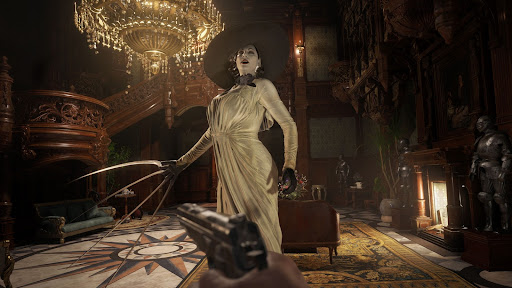
2. RESIDENT EVIL: VILLAGE
This game gave us the big vampire lady so it’s the best
If RESIDENT EVIL: VILLAGE is remembered for nothing else, it’ll be for the absolute stranglehold it had on the internet in the months leading up to its release. This stranglehold was owed largely to the desires of fans wishing one of the primary antagonists would have a stranglehold on them. In an interview, Capcom claims they had no idea that Lady Dimitrescu would be as widely, ah, “accepted” as she was, but I don’t believe them for a damn second. They knew EXACTLY what they were doing with that first trailer. Fortunately for those of us whose internet search history has been smiled upon by the Lord, the rest of the game proved just as attention-grabbing as its de facto vampiric mascot.
The continuing adventures of Ethan Winters, Wife Guy Extraordinaire, took players through what the developers referred to as a theme park of horror, with each of the four main bosses encompassing a different aspect of the genre and different ways to experience it. With a gamut consisting of classic RE puzzle-solving and backtracking, as well as weaponless survival horror, there was a good mix of approaches that never felt too disjointed and moments that players would still think about days after they happened. Story-wise it felt like a fitting end to the story of Ethan Winters, our bravest dad and dimmest bulb, who seemed fed-up with the parade of horrors he’d been subjected to anyway. Add in the opportunity for speedrunning as well as the Mercenaries game mode, and it was a fantastic Resident Evil experience overall. [Steven Porfiri]
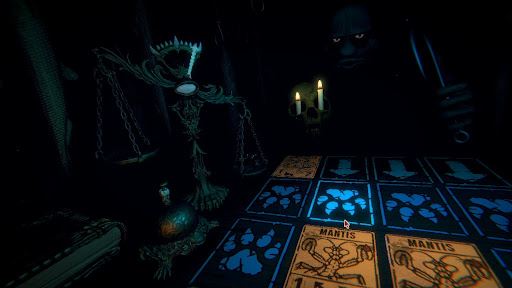
1. INSCRYPTION
There seems to be a trend whenever we participate in these end-of-year lists where some of our top-rated titles cannot be lauded in full for their excellence, mostly out of fear of “spoiling the surprise” for those who’ve yet to play them. And despite the otherwise abhorrent year it was a part of, it seems 2021 holds the trend strong with Daniel Mullins Games’ newest meta-work, INSCRYPTION: one of the most perplexing, dense, and enjoyably subversive experiences to come out of the indie scene in some time.
To be clear, the term “experience” is used very deliberately; to view INSCRYPTION at face value as an unsettling, creepypasta-ish deck builder robs the game of its intimacy with those on the opposite end of the screen. It oozes equal parts mystery and dread, creating constant unease as it engrosses us through unsettling ambiance, exploratory tension, and just enough sinister implication to warrant an audible “what the hell’s going on?” with every failure. It’s an experience that freely toys with the expectation and conventions of not just deckbuilders, but games as a whole, warping them in inventive ways and coaxing the player to do the same both on and off the game board lest they meet a grisly end. And by the time the player has run the gamut, dissected the system, and thinks they have bested the shadowy DM of their torturous tabletopping, the whole experience evolves, metamorphosing into an entirely different (and much more insidious) beast. INSCRYPTION holds a lot of its cards close to the chest, but once you get to see them in play, it’s impossible to view this title as anything short of mastery within the medium. [Jon Farah]






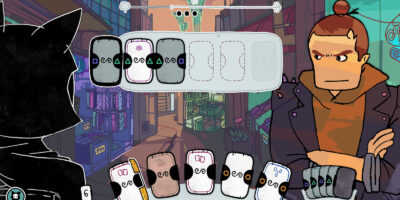








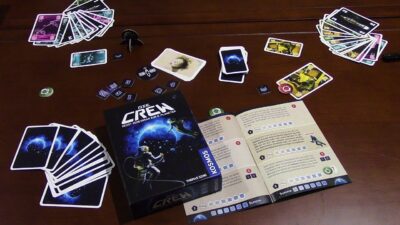
Comments